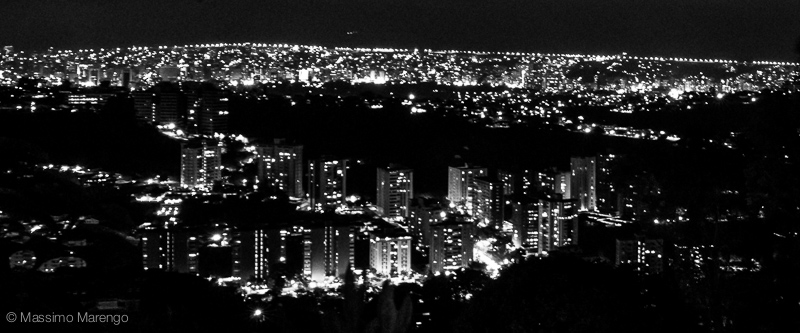 |
| Claudia (Merida, VE, January 4, 2009) |
Venezuela is a special place. It is a young country (almost one third of the population is less than 15 years old) and as such it has the dreams, energy and optimism of youth embedded in its social fabric. It is a nation of contrasts: one of the main oil exporters in the world, it has a significant fraction of its population living precariously in shantytowns that are washed downhill during tropical downpours. I don't want to get into the minefield of the political and social situation that the country is living today (this is for another long post), but the result of the current instability is a high level of crime that is affecting just about everybody.
The venezuelan situation is clearly not unique. Think of the drug gang wars in other latin american cities (or certain suburbs in South Chicago). What makes venezuelan crimes really special are the same enterprising qualities that make venezuelan one of the most entrepreneurial people in the world. Take the pirañas of Maracaibo.
Maracaibo is the second largest city in the country, on the shores of the homonymous lake opening on the caribbean sea, and at the center of one of the historical oil fields in Venezuela. The pirañas are a gang of thieves of hairs. Yes, that was not a typo. I really mean hairs, the filamentary stuff that grows in the head of most people. Maracaibo is now at the center of an epidemic of hair thievery.
What happens is that Venezuela is a country whose inhabitants are particularly keen on taking care of themselves. It is estimated that Venezuelan spend one fifth of their disposable income in beauty products, making Venezuela the largest consumer of cosmetics and personal care products in the world (9.3% share of the world market, according to a 2004 industry trade report). Venezuelan need and depend on their cosmetic products. The problem with this, however, is that most cosmetics are produced outside the country, and need to be imported and paid in foreign currency (US dollars). The venezuelan government, however, has instituted a strict exchange control that severely limits the amount of currency available for foreign trade, leading to a scarcity of imported products among which, you guessed, cosmetics (along with other essentials like toilet paper). Scarcity makes prices go up, and as a consequence cosmetics are now very expensive, and this includes hair extensions, now fetching over $200 on the black market.
And this is how we got to the pirañas in Maracaibo. Hairs have become a valuable commodity, and an easy one to steal: there are now many reports of women that are rounded by hair-thieving gangsters that order them to collect their hair in a ponytail, which is then cut with a razor blade. So far the phenomenon seems to be restricted to Maracaibo, but it has the characteristics of an epidemic, to the point that the venezuelan president felt the need to address the problem on television. And some genius has already proposed to outlaw hair extensions altogether, as if that would stop the black market of stolen hairs.
In the photo above is a cousin of Mayli: she doesn't live in Maracaibo so her beautiful hairs are safe. The photo below shows a section of Caracas at night: the little luminous dots on the horizon are lights in the shantytowns surrounding the city. Many of those light are stolen, in the sense that those neighborhoods are not served by the electric utilities: residents often highjack power from the grid with pirated connections to the electric power line.
 |
| Caracas, Venezuela (December 17, 2004) |
No comments:
Post a Comment